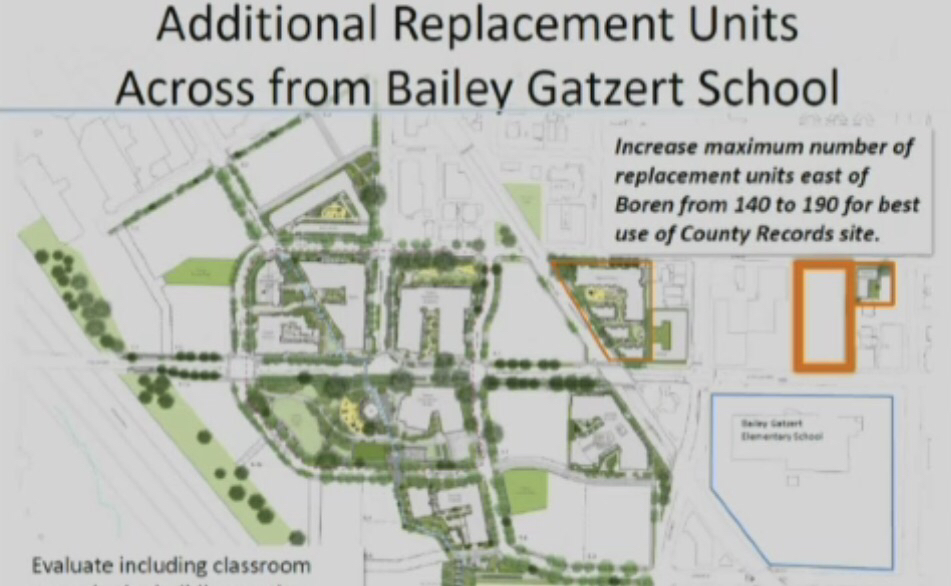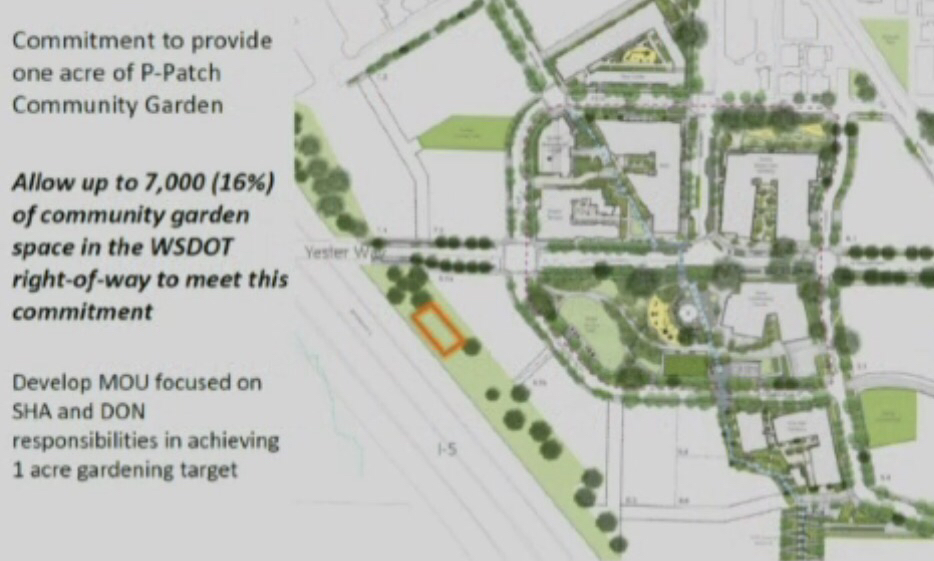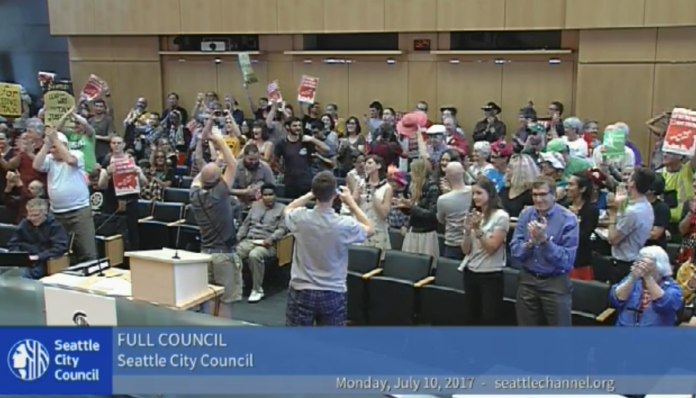Seattle is on its way to getting its own income tax. Yesterday, an ordinance to institute a tax on high-income earners passed out of Council chambers and appears headed for approval by the Mayor. Separate legislation also passed to update the City’s Rental Registration and Inspection Ordinance and revise an agreement with the Seattle Housing Authority on terms for redevelopment of Yesler Terrace.
City Income Tax Passes
A new income tax unanimously passed by the Seattle City Council on Monday. The income tax would affect high-income earning households in the city. The income tax will be set at 2.25% of gross income, which kicks in at income above $250,000 for single individuals and $500,000 for married couples. The income tax will be implemented in 2018 capturing all income during that first year and then becoming due for tax payment in 2019 during the regular April 15th tax day. The income threshold for taxation will generally go up year to year with inflation.
The income tax is expected to apply to only about 5% of Seattle’s households, or some 8,500 households. Revenues from the tax are anticipated to be $140 million in the first year, though the tax will be somewhat volatile due to income changes over time. Proceeds from the tax are to be focused into six key areas:
- Lowering the burden of property taxes and other regressive taxes;
- Addressing the homelessness crisis;
- Providing funding affordable housing, education, and transit;
- Replacing federal funding potentially lost through federal budget cuts, including funding for mental health and public health services;
- Creating green jobs and meeting carbon reduction goals; and
- Administering and implementing the income tax.
During the Council meeting, Councilmember Lorena González offered an amendment to the bill. The amendment centered on reducing Business & Occupation (B&O) taxes in the city and how they might be one of the taxes reduced. There was disagreement by some Councilmembers on the broad scope of the amendment, but Councilmember González said that B&O tax reductions should be focused on small local businesses. The amendment passed on a 6-3 vote.
The law is widely expected to be appealed and end up in court–though proponents expect to successfully prevail under the state’s law prohibiting net income taxation since the legislation taxes gross income. Proponents also believe that the State Supreme Court will rule favorably on the tax measure with regard to tax progressivity.
Rental Registration and Inspection Ordinance
An ordinance to strengthen and overhaul Seattle’s Rental Registration and Inspection Ordinance (RRIO) also passed. The ordinance will make a variety of key changes to how residential rental buildings and units are inspected:
- 20% of all units of a multi-family residential property will be required for inspection, up from 15% today. This will apply consistently across properties that have duplexes, triplexes, and fourplexes. However, large properties will remain capped at 50 units for any required property inspection.
- Private inspectors of rental units will be required to provide a completed inspection card, a change from today which only requires an inspector to certify compliance (property owners may hire City inspectors or private inspectors at their discretion).
- As part of inspection, rental property owners will need to ensure that all lead paint is properly addressed, carbon monoxide and smoke alarms are installed in units, and latches are used to secure ground floor windows.
- The ordinance also requires other health and safety provisions as part of building inspections, such as power outlets within three feet of a water sources in kitchens, bathrooms, and laundry rooms being grounded with a fault interrupter, and emergency exit signs being powered for illumination in the event of power failure.
- Tenants of RRIO units that are inspected will also now be notified of whether or not their unit passed or failed inspection.
The changes will be reflected in the standard RRIO checklist and codified in the RRIO and Housing and Building Maintenance Code ordinances. Other technical changes related to RRIO and housing maintenance standards are made under the ordinance. Last month, Heidi Groover over at The Stranger shared personal stories about how the RRIO program was not addressing serious health and safety issues of tenants. The changes that passed the City Council should result in better conditions for renters across the board, but particularly in older structures that may not meet modern building code requirements.
SHA Cooperative Agreement Changes
In May, the City agreed to a major amendment to the Cooperative Agreement between the Seattle Housing Authority (SHA) and the City of Seattle for redevelopment of Yesler Terrace. Two months on, another amendment to the Cooperative Agreement was requested by SHA to facilitate the development of more affordable and low-income housing development and make other targeted changes to the agreement. The changes of agreement terms include:
- Establishment of a third phase of affordable and low-income housing development in Yesler Terrace;
- A proviso for $13 million in City funding for affordable and low-income housing development;
- A preference to include a preschool in a future SHA development near Bailey Gatzert Elementary School; and
- Leasing property from the state along I-5 for a community garden; and
- Modest revisions to the “right of return” to Yesler Terrace.
A new third phase (Phase III) for housing production has been added to the Cooperative Agreement. The added phase will commit SHA to development of at least 420 affordable and low-income public housing (LIPH) replacement units. 263 of these will be LIPH replacement units. Another 157 units will be targeted as affordable housing units for households at or below 60% of the area median income. Development of the housing will be across four separate multi-family housing projects.
One of the Phase III projects includes a site east of Boren Avenue right across the street from Bailey Gatzert Elementary School. SHA will develop at least 190 LIPH units on the site, an increase of 50 such units from the original plan. As part of the project, SHA plans to provide a mix of family-sized units and will consider the inclusion of preschool classrooms that would facilitate the City-backed Seattle Preschool Program. The classrooms are contingent upon capital funding from the the City.

Total development costs for Phase III are estimated to top $250 million with proceeds coming from a mix of land sales, grants, bonds, and other financing tools. Of that, $13 million will be set aside by the City from the Housing Levy for affordable and low-income housing development. The Housing Levy funding will be used for 103 affordable housing units and 195 LIPH replacement units. Disbursement of the funds is fairly prescriptive:
- $6 million will be released on or after 2018 for 67 LIPH replacement units and 48 affordable housing units;
- $3.5 million will be released on or after 2019 for 64 LIPH replacement units and 41 affordable housing units; and
- $3.5 million will be released on or after 2020 for 64 LIPH replacement units and 41 affordable housing units.
In total, the Housing Levy funding will help develop a total 325 affordable and low-income housing units in Phase III of Yesler Terrace’s redevelopment.

Separately, added language to the updated Cooperative Agreement includes a new community garden (P-Patch) that will be situated between I-5 and Yesler Terrace in right-of-way owned by the Washington State Department of Transportation. The right-of-way to be leased from WSDOT will allow a portion of the terraced landscape east of I-5 to be used for urban farming by SHA residents. If for some reason, the lease is terminated by SHA or WSDOT in the future, SHA will be obligated to find commensurate space within or next to Yesler Terrace for community gardens.
The City Council agreed to the change of agreement terms.
Progress Report On Yesler Terrace Redevelopment Highlights Success
Stephen is a professional urban planner in Puget Sound with a passion for sustainable, livable, and diverse cities. He is especially interested in how policies, regulations, and programs can promote positive outcomes for communities. With stints in great cities like Bellingham and Cork, Stephen currently lives in Seattle. He primarily covers land use and transportation issues and has been with The Urbanist since 2014.


